Over a Million Fully Vaccinated Croatians
25 June 2021 – The number of fully vaccinated Croatians rose over 1 million. This means over 30% of adults in Croatia have received all the necessary doses of the vaccine.
The anti-COVID19 vaccination rush started a few months ago in Croatia. During winter some rather unpleasant truths surfaced as to how the distribution of vaccines among EU countries works. Along with the inability of AstraZeneca to deliver the vaccine in a timely manner, it seems Croatia was not getting its fair share of those that arrived in the EU, especially when compared to some richer countries of the union. The situation did change for the better. In the last few months, Croatian vaccination efforts have been progressing steadily.
Tportal.hr quoted Prime Minister Plenkovic's tweet from this morning in which he boasts good vaccination numbers. He announced Croatia surpassed one million fully vaccinated citizens. He also urged Croatians to continue with the positive trend and enter autumn and winter fully protected.
Promising Numbers
Official data by the Croatian Institute of Public Health say 1.020.266 persons are now fully vaccinated. Out of them, 1.000.279 have received both doses of Pfizer, Moderna, or AstraZeneca vaccines. 19.281 persons have received one (and only) dose of the Jannsen vaccine. If you think one million people is not a big number, you are forgetting the size of Croatia. These numbers mean 30,4% of the adult population of the country is now been fully vaccinated. This is not a bad result, especially when all the problems from the start of the vaccination process are considered.
Croatian Institute of Public Health is calling upon citizens to continue showing up for available vaccination appointments. They are also urging older citizens to show up a bit early and limit the amount of time they will have to wait in the heat. Bringing water, something to eat and preferably a sun umbrella is also a good idea.
As the fight against COVID19 continues, Croatians are hoping these numbers continue rising and the rest of the summer brings enough tourism revenue to ensure a more peaceful winter.
For all you need to know about coronavirus specific to Croatia check out our COVID-19 section and select your language.
Croatian Ferry Jadrolinija Adds "Young" 18 Year Old Vessel to Fleet
June the 25th, 2021 - The Croatian ferry Jadrolinija has added a ''young'' eighteen year old vessel to its fleet. The ferry company has previously been accused of never acquiring anything but old ships, and this one is quite youthful in comparison to some it boasts.
As Poslovni Dnevnik/Marija Brnic writes, the largest national shipping company, Jadrolinija, is continuing o procure new but very much used ships - it has rejuvenated its fleet with the aforementioned ferry purchased from the local shipping company Rapska plovidba.
It is a smaller ship, which will replace the ferry "Prizna", which is more than 50 years old, which operates along the Biograd - Tkon line between the mainland and the island of Pasman. The new ship will sail under the name "Tkon", and is 42 metres long, 15.3 metres wide, and has a capacity of 250 passengers and 35 vehicles.
The ship cost the Croatian ferry Jadrolinija 5.3 million kuna plus VAT, ie 6.6 million kuna, but it is also interesting that this price is higher than the estimated value of the procurement stated in the public tender opened back in April this year.
The Croatian ferry Jadrolinija was ready to pay a maximum of 4.5 million kuna without VAT, or 5.7 million kuna, for the new ship with the characteristics that Rapska plovidba's offer fits into.
In the explanation for such a decision, the Croatian ferry Jadrolinija calls for the use of the possibilities from the Public Procurement Act from Article 298, paragraph 9. According to that Act, in such cases, if the offered price of the most favourable bid exceeds the estimated value of the procurement, it is accepted.
Rapska plovidba appeared in this tender as the only bidder, and the inspection of the passenger ship determined that it meets all the required conditions of the Croatian ferry Jadrolinija.
''Tkon'' will sail as the 55th vessel in the seemingly growing fleet operated by Jadrolinija, for which this is the fifth ship purchased in the last four years with the strategic goal of rejuvenating the fleet.
For more, follow our dedicated business section.
Austrian DocLX Company to Ensure Safety in Istria for Graduates
June the 25th, 2021 - The Austrian DocLX company is going all out to make sure a group of Austrian graduates can celebrate the end of their studies in Istria without potentially endangering the local community's health and epidemiological picture.
As Poslovni Dnevnik writes, the Austrian DocLX company, which is the organiser of travel and other similar events, will apply an innovative security concept to prevent the spread of the coronavirus so that Austrian graduates can celebrate the end of their school year right here in Croatia safely, the company said in a statement.
The concept of the ''safety bubble'' which is successfully used in competitive sports, will provide the group of Austrian graduates with a safe environment while also protecting the local community from the spread of the novel virus which has dominated the world since the very beginning of 2020.
Strict safety protocols were developed by the Austrian DocLK company together with numerous renowned experts and advisers of the Austrian Federal Government, including Meduni-Wien, Professor Hans-Peter Hutter, as well as respected epidemiologist Professor Michael Kandy.
The complete concept of safety and prevention during the ongoing pandemic is being implemented on the Lanterna peninsula in Istria on 630,000 square metres thanks to the Austrian DocLX company's safety concept. Their concept is otherwise based on extensive testing and the creation of the aforementioned ''safety bubble''. Each participant will be tested using a PCR test two days before their departure, then immediately before their departure or before boarding the bus itself.
Every other day during the event, all of the high school graduates and employees will continue to be tested using the mandatory PCR test, considered to be the gold standard in detecting the presence of SARS-CoV-2 in the nose and throat. Approximately 630,000 square metres of leased land on the peninsula has only one access road leading to it that is completely closed off to unauthorised persons.
Preventive measures have been developed and implemented in close coordination with the Austrian and Croatian health authorities and have been formally approved for the group of graduates from Austria.
For more, follow our travel section.
As Scorching Heatwave Continues, HEP Turns on Zagreb's Radiators
June the 25th, 2021 - HEP has certainly been ''helpful'' to the currently melting reisdents of Zagreb by turning on their radiators in the middle of an intense heatwave.
We're currently on Brac and spending most of our time trying to remain awake as the sun drains every atom of energy from us. A lot of lying under the air conditioner and trying to imagine what a cold breeze actually feels like has been going on. The heatwave is a strong one, and despite our house being right next to the sea, there's very little rescue from the sun's burning rays these days.
One thing we're thankful for is that we're not currently at home in Zagreb, where the temperatures are soaring and swimming in Jarun or the Sava just doesn't quite cut it. HEP has made the situation a lot worse for some of the city's residents by mistakenly turning on their heating, full blast. A big help indeed.
As Poslovni Dnevnik writes, confused residents of Vladimir Filakovac Street in the City of Zagreb were more than just a little surprised yesterday when they felt that their radiators were heating up to the highest strength possible during the intense heat of the day, reports RTL.
“Our radiators are hot, they're heating up to the highest possible strength. Is that happening just to us or is it everyone? What's going on?'' awoman from Zagreb asked on social media.
In the middle of the ongoing and absolutely exhausting heatwave, the valve broke down, which caused a temporary leakage of thermal energy for indoor heating into the building system, they explained from HEP-Toplinarstvo.
''Immediately after working out what had happened, the defect was rectified. We'd like to take this opportunity to apologise to our end customers for that situation and note that now the heating system in the building in question is functioning properly,'' they assured from HEP-Toplinarstvo, understanding that having the heating on full blast during an intense heatwave isn't really a much desired situation.
For more, follow our lifestyle section.
Bogdanović is Back: Croatia Basketball Tops Puerto Rico in Second Split Friendly
June 25, 2021 - In the second friendly match in Split, this time closed to the public, Croatia basketball tops Puerto Rico 72:66 (22-18, 24-9, 10-17, 16-22).
Puerto Rico started attacking aggressively, jumping to a 2-9 lead, forcing coach Veljko Mršić to call a time-out. Croatia successfully completed several well-executed plays and took the lead at 11-9. There were a few more draws in the first half, but Croatia held the reins firmly in their hands, and did not allow Puerto Rico to threaten the result seriously in the remaining three quarters, reports HKS.

HKS
Croatia held the biggest advantage when they were up by 23 points at 52:29 and 54:31 in the third quarter, both times thanks to Ante Toni Žižić. By the end of the game, Puerto Rico managed to get close to a single-digit difference.
Bojan Bogdanović also officially played the first game in this cycle of preparations, scoring 12 points with 5 assists. Ante Žižić was perfectly accurate (7/7 for field goals and 4/4 free throws) with which he scored 18 points and 7 rebounds. Captain Roko Leni Ukić also hit double digits with 11 points and Miro Bilan with 10 points.
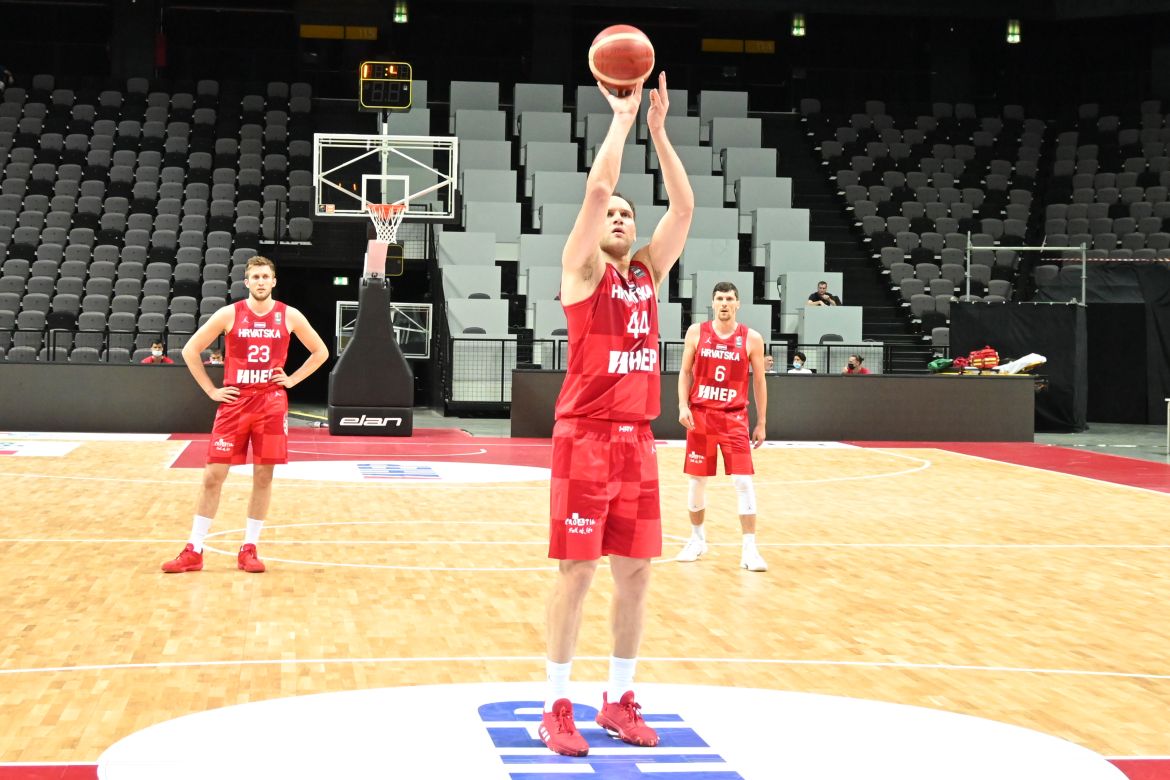
HKS
“This match was closed to the public; we tried some things to see what it would look like. This is our second game in 24 hours. The first 25 minutes were excellent, we were up by 23 points, but we gave up in the last 15 minutes. We allowed Puerto Rico a lot of attacking jumps, as well as some points from the counterattack. The defense was at a nice level, we received 66 points, and we also created quite good situations offensively. Just like yesterday, our shots were weaker. However, 20-25 shots were made well, and when the tournament comes, and we are fresh, they will go in. All in all, we are satisfied. That preparation period was not easy because we got a new player every preparation game, and we had to start from scratch again, have the training, and show actions. There was a little loss of rhythm and intensity in training. However, now we have five days left until the first game of the tournament; it's time to get well, play, do our best, and try to qualify for the Olympic Games," said Veljko Mršić, the national team coach.
The Olympic qualifying tournament in Split is held from June 29 to July 4, and Spaladium Arena is partially open to the public. Tickets can be purchased at ulaznice.hr and the Spaladium Arena box office.
"I would really like the hall to be filled as much as possible because we really need it. It is different to play in front of a full hall, and that is why I invite all basketball fans to come, support us and together, in synergy, win a place in the Olympic Games and enjoy those four days of top basketball."
To follow the latest sports news in Croatia, follow TCN's dedicated page.
To learn more about sport in Croatia, CLICK HERE.
Croatian Invasion in Copenhagen: Croatia Sector Sells Out against Spain!
June 24, 2021 - The Croatia sector at Parken stadium in Copenhagen has sold out for Croatia's round of 16 match against Spain!
Within four hours after the start of ticket sales for the EURO 2020 round of 16 Croatia-Spain match, Croatia fans bought all available tickets for the Croatia sector at the Parken Stadium in Copenhagen, HNS reports.
Ticket sales for the Croatia sector began at 11:00 am on Thursday via Uefa's ticket portal, and tickets could be purchased using access codes. At around 15:00, all available tickets for the Croatia sector were sold out, which will thus be filled to capacity in the EURO 2020 round of 16 match against Spain, played on June 28 at 18:00 in Copenhagen.
On Friday, June 25, the free sale of tickets for neutral fans will start via the Uefa ticket portal, if there are unused tickets from other quotas available to Uefa.
The Croatian Football Federation recommends all fans, regardless of the country they come from to Copenhagen, follow the current information on the rules of entry into Denmark on the official website of the Danish authorities.
The rules for entering the Parken Stadium in Copenhagen can be found on the official UEFA website.
Croatia and Spain have played a total of eight games, winning three, drawing one, and losing four. If you ask the bookmakers, Croatia will record their fifth defeat on Monday because Spain is the big favorite of the match. The odds on their victory dropped to 1.60, and Croatia's climbed to a whopping 6.00.
Recall, Croatia lost to England at Wembley, drew against the Czech Republic in Glasgow, and defeated Scotland in Glasgow to win second place in Group D. Spain drew against Sweden and Poland but topped Slovakia 5:0 for second place in Group E.
To follow the latest sports news in Croatia, follow TCN's dedicated page.
To learn more about sport in Croatia, CLICK HERE.
Ending Segregated Education in Vukovar? Mayor Ivan Penava Announced an Idea
June 25, 2021 - Is there any possibility of ending segregated education in Vukovar? Mayor Ivan Penava announced Serbian and Croatian education could merge in school and kindergarten levels, but more details are yet to be revealed.
The start of the week saw interesting news that surprised many. As reported by N1, Ivan Penava, the mayor of Vukovar, announced Croatian and Serbian classes and kindergartens could merge together.
Vukovar, often referred to in Croatia as the „Hero City“ for the heavy blow it suffered in the 90s war Croatians refer to as Homeland War, still has a lot of ruins as memories of that ugly past. In the light of national tensions among Serbs and Croats, the segregation of kindergartens and different shifts in schools for Serbian and Croatian classes seem to be a solution to keep the peace.
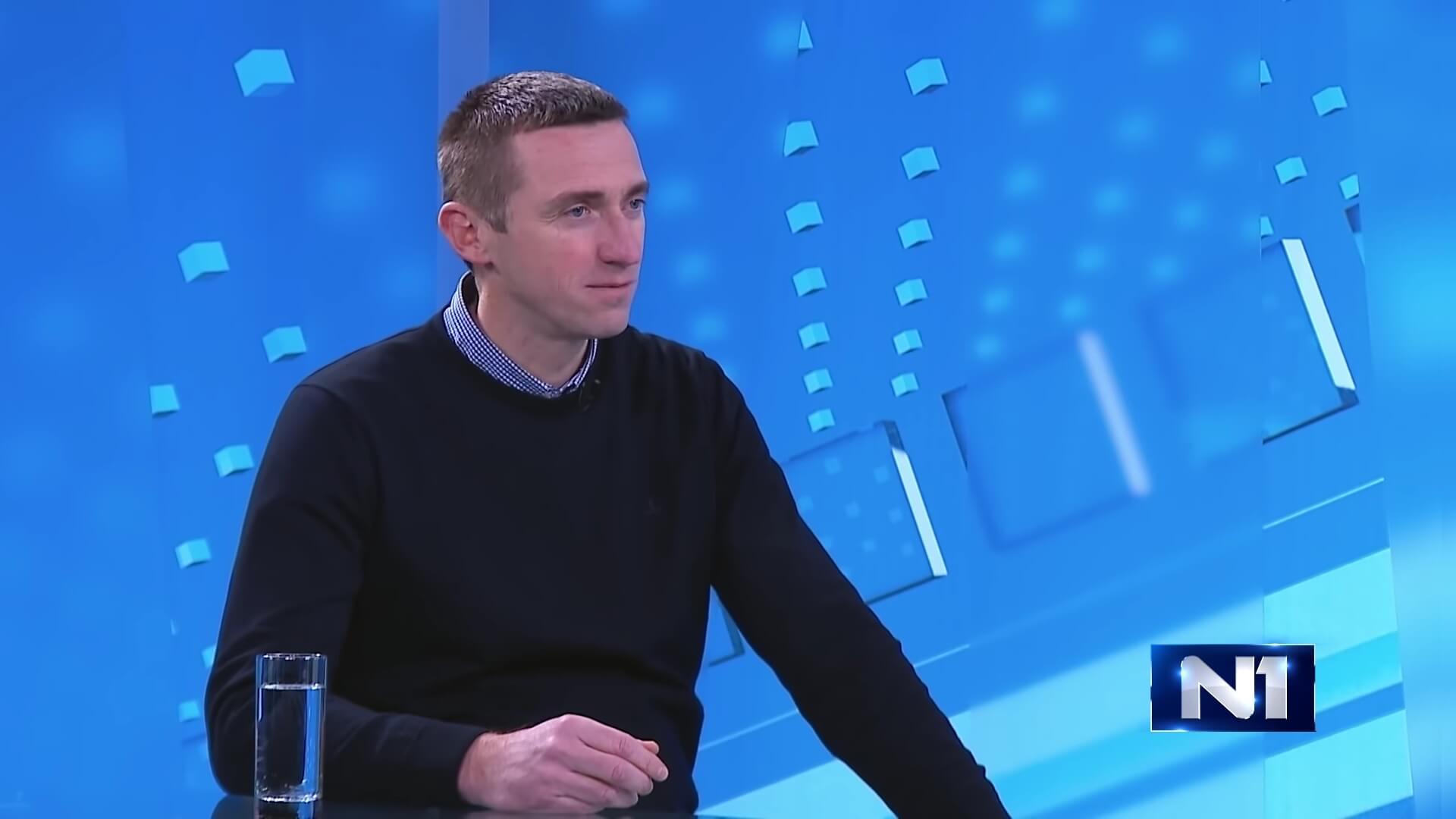
screenshot/ N1
Good idea but more talks needed?
„In Vukovar, parents do not choose the model of education that is imposed by politics, it is nowhere written in public“, said mayor Penava, as reported by N1.
Penava, a former member of the Croatian Democratic Union (HDZ), despite earning a new term in the recent local elections as an independent candidate, enjoyed support from Miroslav Škoro, runner-up candidate for Zagreb mayor elections, and the leader of the Homeland Movement (DP) supports Penava's idea.
„I lived in America for a number of years, in Hungary, I traveled the world... what is the difference between Serbian and Croatian mathematics? Is Argentina in Serbian in the northern hemisphere, and southern in Croatian? I don't get it“, said Škoro adding that segregation was done in malice with a tendency to divide children from the start.
„In Vukovar, the symbol of defense had priorities. Reconstruction of the water tower, and certain moves Penava did well in his last term (he wouldn't win elections if he hasn't), thinks that city needs to move on. I support him 100%“, concluded Škoro.
On the other hand, criticism is erected on national-level politics.
„I don't think that local officials are the ones who need to determine a way in which minority education will be conducted. Political trade is clear here, and I'm glad there is no longer just Serbian-Croatian trading coalition, but also another one“, said Dragana Jecov, a Croatian parliament member from the Independent Democratic Serb Party (SDSS) referring to the accusations of the right-wing that current coalition of HDZ and SDSS and is vile political trade.
Interior Minister Davo Božinović also said that while we need to work on erasing national, social, and political tensions, but this is a question that needs to be discussed more seriously.
Additionally, as N1 reported, the Ministry of Education pointed out that different models of education for Vukovar schools exist, and parents can choose which they find most suitable.
Accepting national differences or nationalistic uniformity?
Some improvements have indeed been seen in the city infrastructure, but Vukovar still remains a challenging place to live. Partly due to the tough economic situation, but also because of discrepancies among Serbian and Croatian residents. Earlier in June, there was even a violent incident when a 30-year-old Serbian member of the Grobari football fan group physically attacked a Croatian 13-year-old boy in front of a bakery for having a medicine mask with Croatian symbols.
„Sadly, this kind of thing happened too long in Vukovar, where people attack each other because of national disputes. Media aren't even introduced to some of these events. It is spread a lot, as evident by the constant police patrols around Vukovar high-schools where there are always police cars around“, said Vukovar police to Večernji List daily newspaper.
Such incidents, a misfortunate loose ends of the war, also come from the Croatian side. Earlier in May, a group of young men chanted anti-Serb slogans in Borovo Selo (close to Vukovar), a scene of heinous war crimes in the '90s), sparking condemnation from both president Milanović and the Croatian Government.
In that light, integrated schools might finally bring positive changes in regards to tolerance and peaceful life for Vukovar citizens. But again, not everyone sees the glass as half full.
Index.hr columnist Gordan Duhaček agreed in his column that Serbs and Croats don't need to go to separate shifts but warns how Penava isn't the guy that should unite them.
„Penava doesn't want to integrate Vukovar schools and end the troubling segregation in a way to ensure a better future for the whole city, but instead to impose his nationalistic, often anti-Serbian narrative as the official one. Penava wants that Vukovar Serbs bow down to his view of the Croatian state“, wrote Duhaček.
Duhaček also reminded the readership of the attempt and fail of the Danube International school that supposed to integrate pupils of both nations, an idea that spawned 16 years ago. But, the project failed, and Duhaček sees both Penava and SDSS leader Milorad Pupovac not feeling too sad about it.
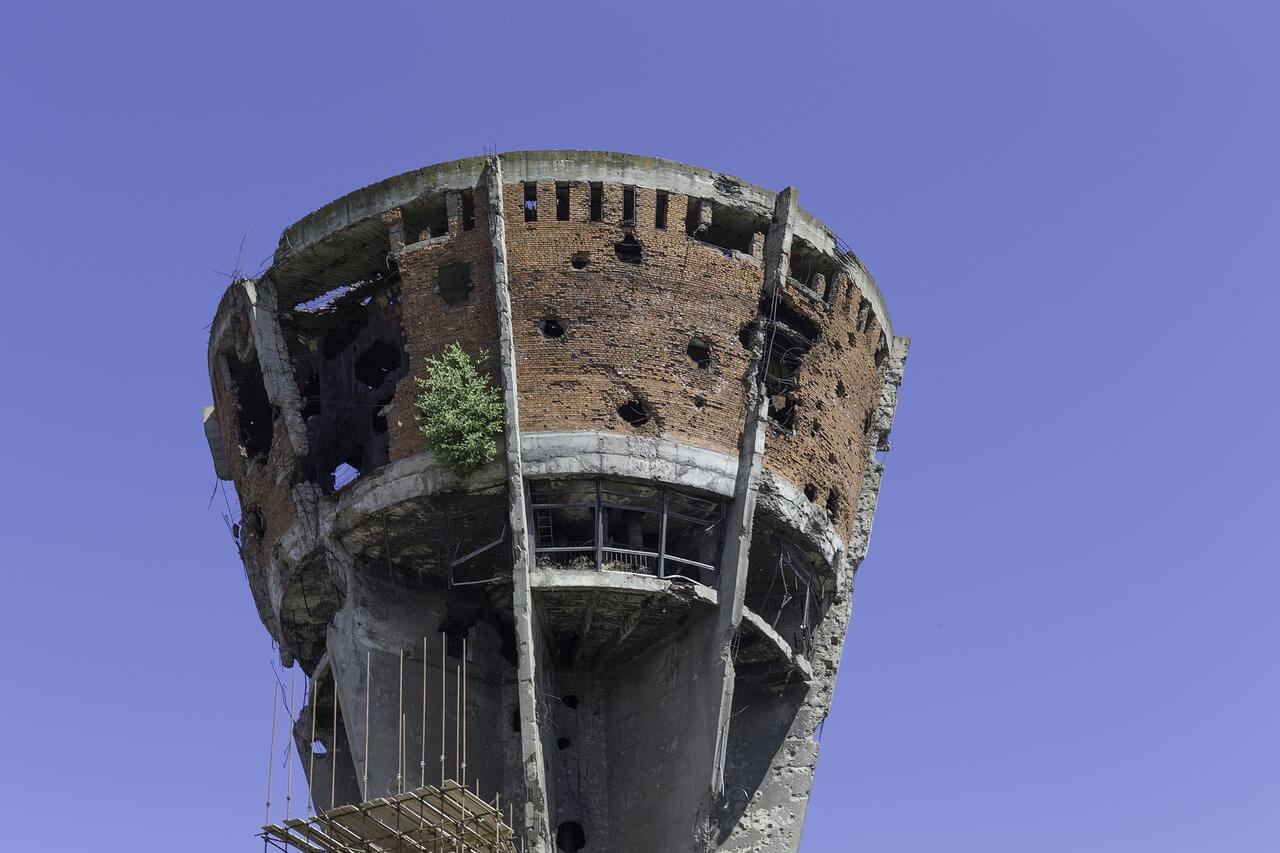
Iconic Vukovar water tower, pixabay
Questions on details
At the end of the week, the situation seems more confusing than clear. Is class integration a good idea? Could it save money for the city financially? What are some actual details of merging Croats and Serbians into one class? Obviously, Škoro is right that 2+2=4 in any math class around the world. But, troubling questions appear in subjects such as language and history. Croats and Serbs sadly have their own, different interpretations of historical facts, particularly when it comes to the last war, and while the speakers of two languages perfectly understand each other, some words do differ, and there is a different accent and spelling in the two formal languages. So, how can these issues be resolved? Would those two subjects remain in different shifts while universal subjects such as biology, math, or physics will listen in one merged classroom? Or will there be a different curriculum that would present both Serbian and Croatian history, Serbian and Croatian literature in that way, making Vukovar pupils more knowledgable in those areas than other pupils in the country?
Or some curriculum consensus on history could be reached, one that would satisfy both the Croatian and Serbian sides and thus truly open a doorway to the better understandings of the two nations in the future in perhaps the most nationally torn city in Croatia?
Obviously, Vukovar city authorities have some tensions with SDSS, but the city also has an expert associate for the development of civil society and national minorities, Siniša Mitrović in one of the City's departments. Did Mitrović manage to gain input from the Serbian minority in Vukovar about this merge? And how fast could the whole thing be realized? This autumn or maybe a bit later?
These are important and interesting questions that can only be answered either by mayor Penava himself or perhaps Josip Paloš, the director of the Vukovar City Education Department.
„Mayor Penava is in a lot of meetings and on fields, and his schedule is full. We will sadly not be able to answer you by your Friday deadline, but we will contact you at the earliest convenience“, said the lady at the Vukovar City PR service when I called them (and E-mailed) with a wish to arrange and conduct a brief phone interview.
While this article may present the current issues surrounding segregated education in Vukovar, this TCN reporter hopes mayor Penava will share more details about his plan on ending segregation in Vukovar schools and kindergarten with joint classes. If done right, this move can indeed be the way to a better, more peaceful future for Vukovar citizens.
Learn more about Vukovar on our TC page.
For more about education in Croatia, follow TCN's dedicated page.
5 Fun Family Destinations in Dalmatia Kids Will Surely Love
June 25, 2020 - In line with the International Children's Festival in Šibenik, we present to you 5 fun family destinations in Dalmatia to give your kids an enjoyable and educational summer getaway in Croatia!
Fun Park Biograd
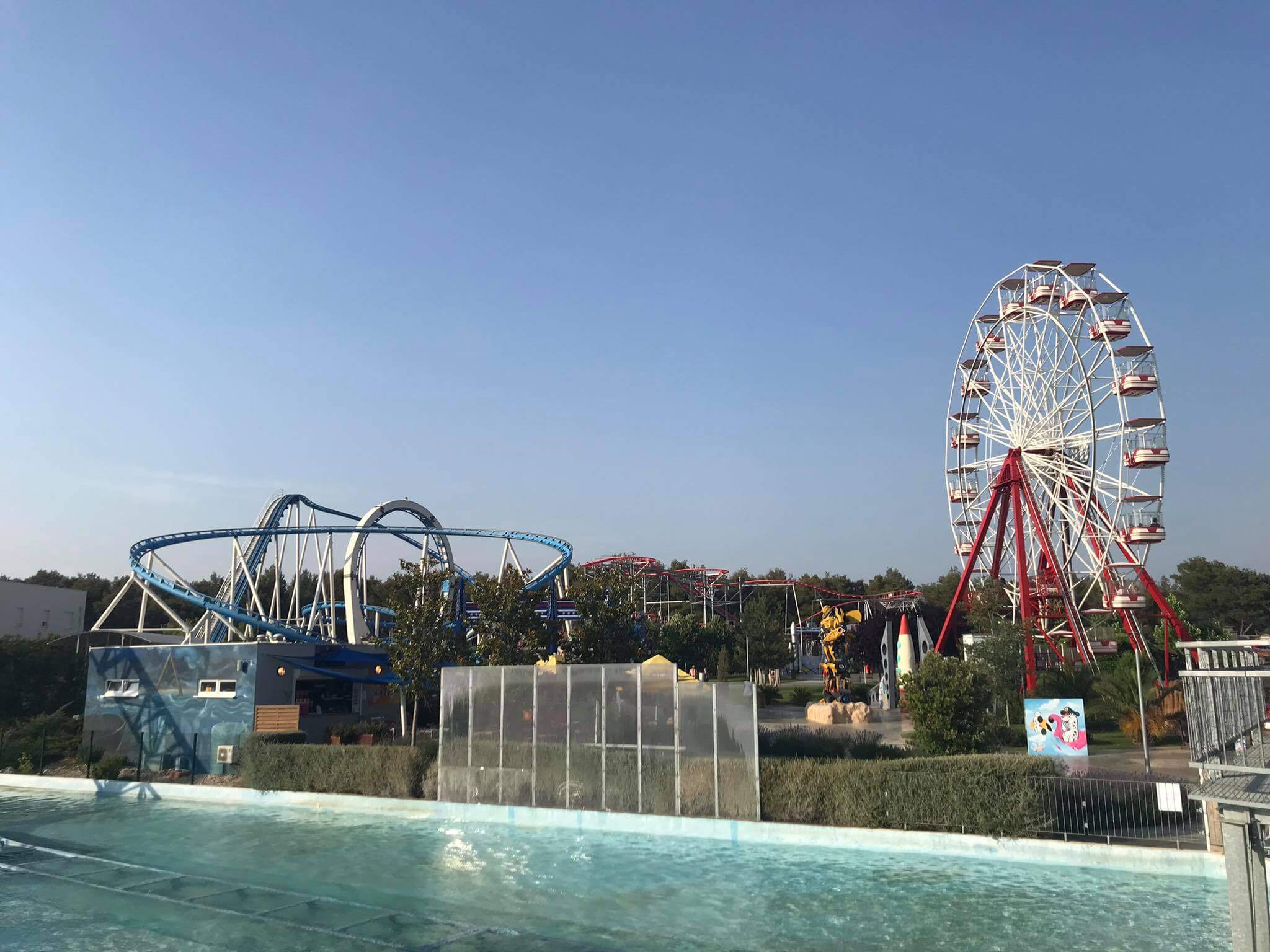 Photo credit: Kyla Ibero
Photo credit: Kyla Ibero
Located in the beautiful and scenic town of Biograd na Moru in Zadar country, Fun Park Biograd offers an array of spectacular fun activities for the whole family. This amusement park is suitable for both youngsters and adults. It has 1 restaurant, 3 food bars, and a fun-filled gift shop. The park is divided into 3 main themes: Galaxy, Wild West/Pirate Bay, and the newest attraction, Atlantis. Fun Park Biograd also hosts special events, teambuilding, and birthday parties upon request.
List of attractions in Fun Park Biograd
The whole family will definitely have an out-of-this-world experience in the Fun Park Galaxy starting from Zero Gravity, made with special trampolines and hoops that will let your kids defy gravity for the whole afternoon. Simulator also offers your kid a space ride experience in a flying car. The adults will enjoy the chilly yet exciting rollercoaster ride in the Alien. XD Dark Ride is the latest attraction in Galaxy. It offers a 7D adventurous virtual experience with all kinds of aliens, monsters, and ghosts and is perfect for both adults and children. Next is the Fun Park Wild West which you can explore through Western Express and the mini rollercoaster Mine Train Coaster which is perfect for the young ones. Let your kids be Indiana Jones for a day as they explore the wild plant and animal life at the Animal Kingdom. Here, you can expect an encounter with the mighty t-rex! For our youngest visitors, the attractions Eureka, Choco Cups, Twister Cars, Indian Canoe, and Carousel will give them an experience they will never forget. Lastly, have a crazy rodeo ride on the Wild Bull before setting off to the Pirate Bay. The Pirate Bay is located in the Wild West. It offers thrilling rides great for kids aged 8 and above such as the Pirate Ship, Bumper Cars, Bumper Boats, and Pirate Battle. The House of Horror is located here, too. This attraction features zombies, ghosts, and tons of jump scares and is only suitable for visitors aged 12 and above. The Fun Park Atlantis is the newest and one of the most famous attractions. It features a gripping car ride that climbs as high as 20 meters and plunges at high speed into the water. Do not forget to bring extra clothes because you will definitely get soaked!
Attractions for the most adventurous ones
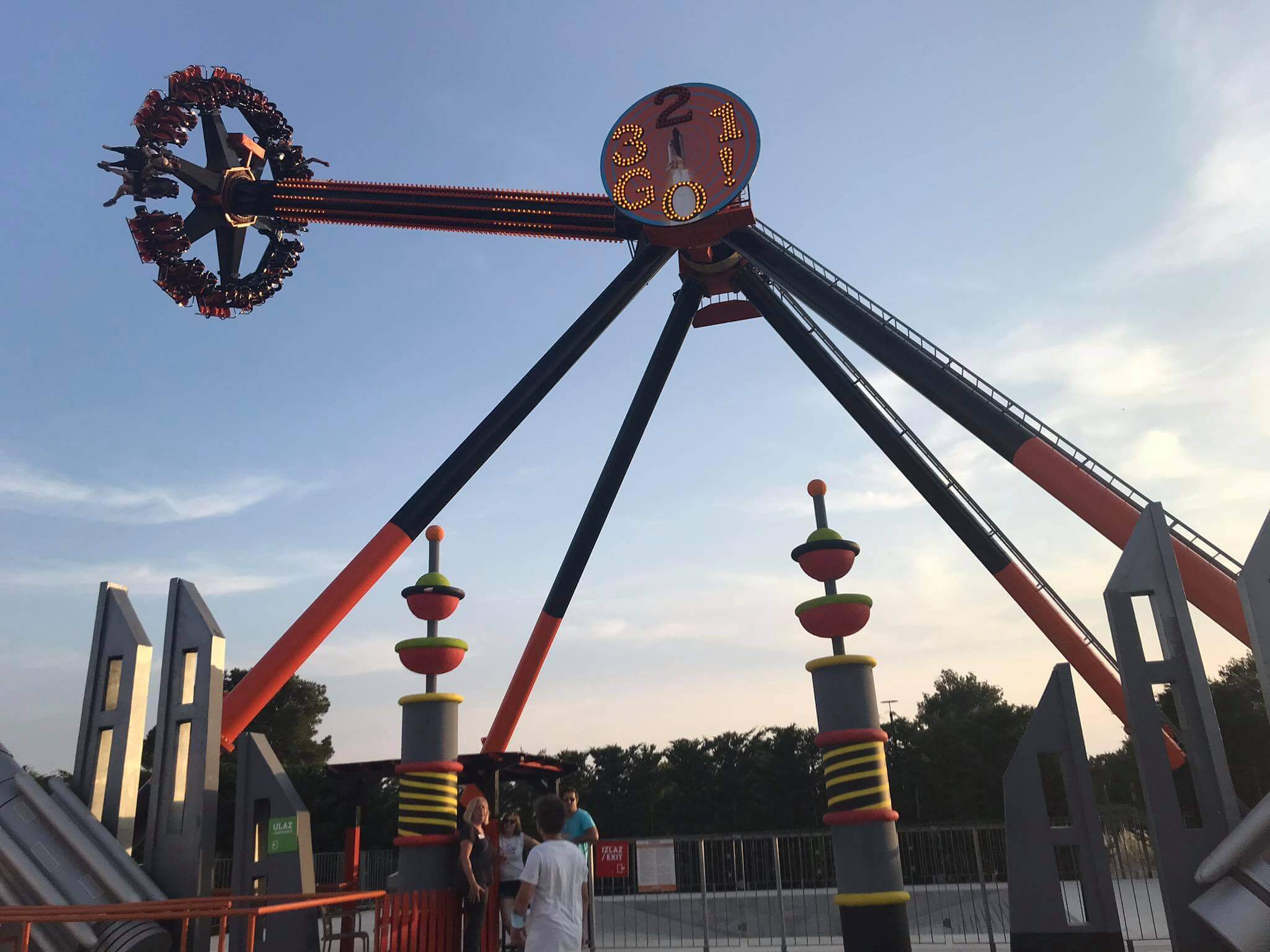
Photo credit: Kyla Ibero
Fun Park Biograd also offers attractions that will surely get your adrenaline running! The 123Go Tornado, a ride that will catapult you at an unimaginable height will thrill even the most daring ones. The roller coaster, Pirate Ship, and Ferris wheel in this park are not to be underestimated as well.
Dubrava Falconry Center
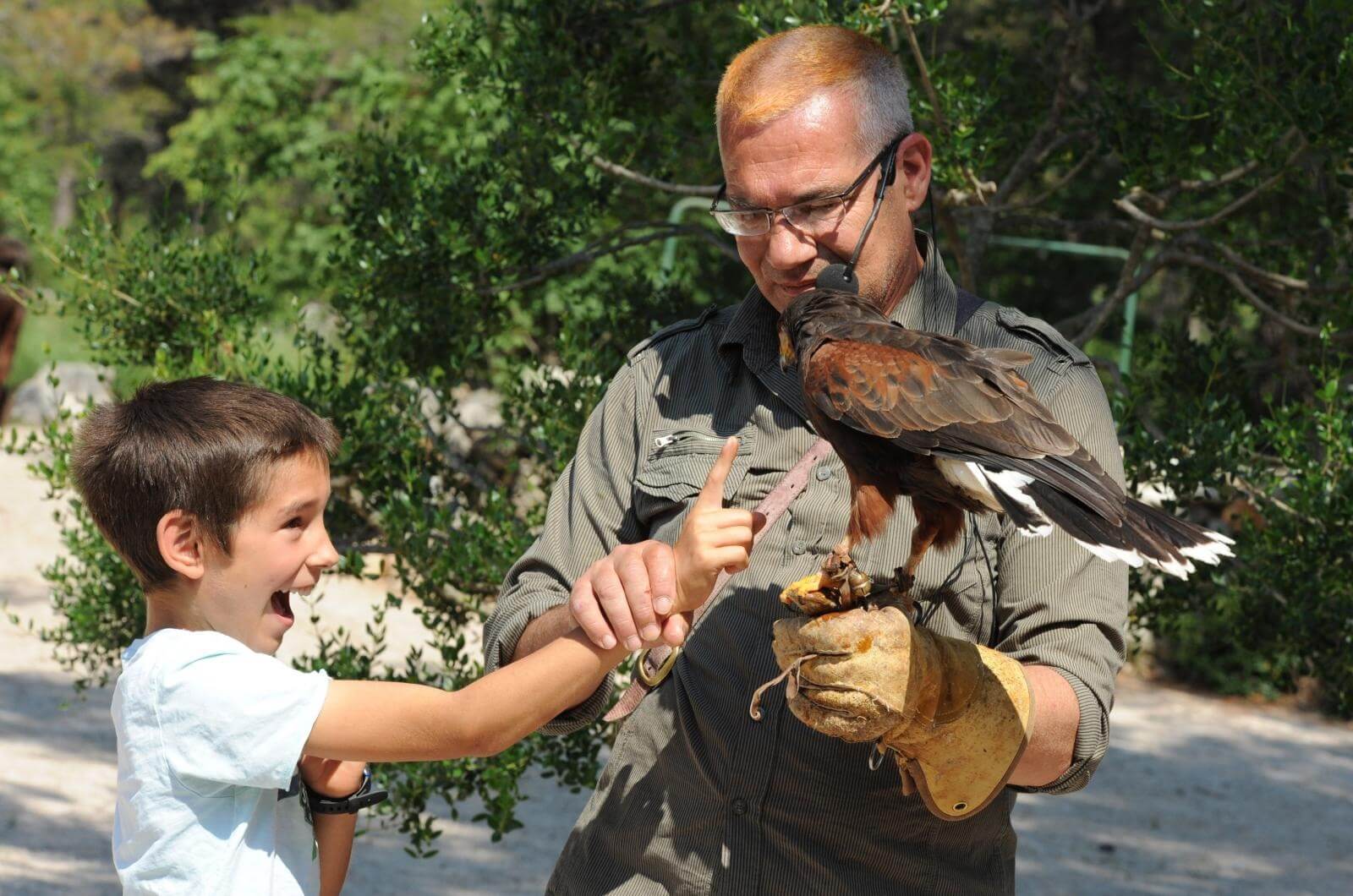
Photo credit: Hrvoje Jelavic / PIXSELL
An authorised institution of the Ministry of Environmental and Nature Protection of Croatia, Dubrava Falconry Center is located in the luscious pine forest of Dubrava, 8 kilometers from the centre of Šibenik, and protects various kinds of birds of prey including falcons. The center aims to continue the Millennium-old tradition and noble skill of falconry that originated from China and was widely used in Europe during the Middle Ages. Learn more about the secrets of these birds and the falconry world and find out why it is important to care for these animals and preserve their population. Dubrava Falconry Center offers a one-day trip in their facility but they also have several opportunities to deeply get acquainted with the world of predators! Find out more on their website: http://sokolarskicentar.com/o-nama/
Amadria Park
Previously called Solaris Beach Resort, Amadria Park is a resort located only 5 kilometers from the center of Šibenik and surrounded by a clean sea and several attractions for children and adults. Krka National Park and Kornati National Park are also close to the area and are perfect destinations for family excursions. Make sure to visit Dalmatian Ethno Village for an authentic Dalmatian dining experience and indulge yourself in their "garden-to-plate" menu. Adults can also have a relaxing day at Amadria Park Wellness and Spa and a chill summer day at En Vogue Beach Club. Amadria Park offers 5 hotels that guests can choose from Amadria Park Hotel Ivan for business and leisure, Amadria Park Hotel Andrija for fun amenities for kids, Amadria Park Hotel Jure for a lavish lifestyle experience, Amadria Park Hotel Jakov for perfect family quality time, and Hotel Niko, for a casual holiday trip.
Aquapark Dalmatia
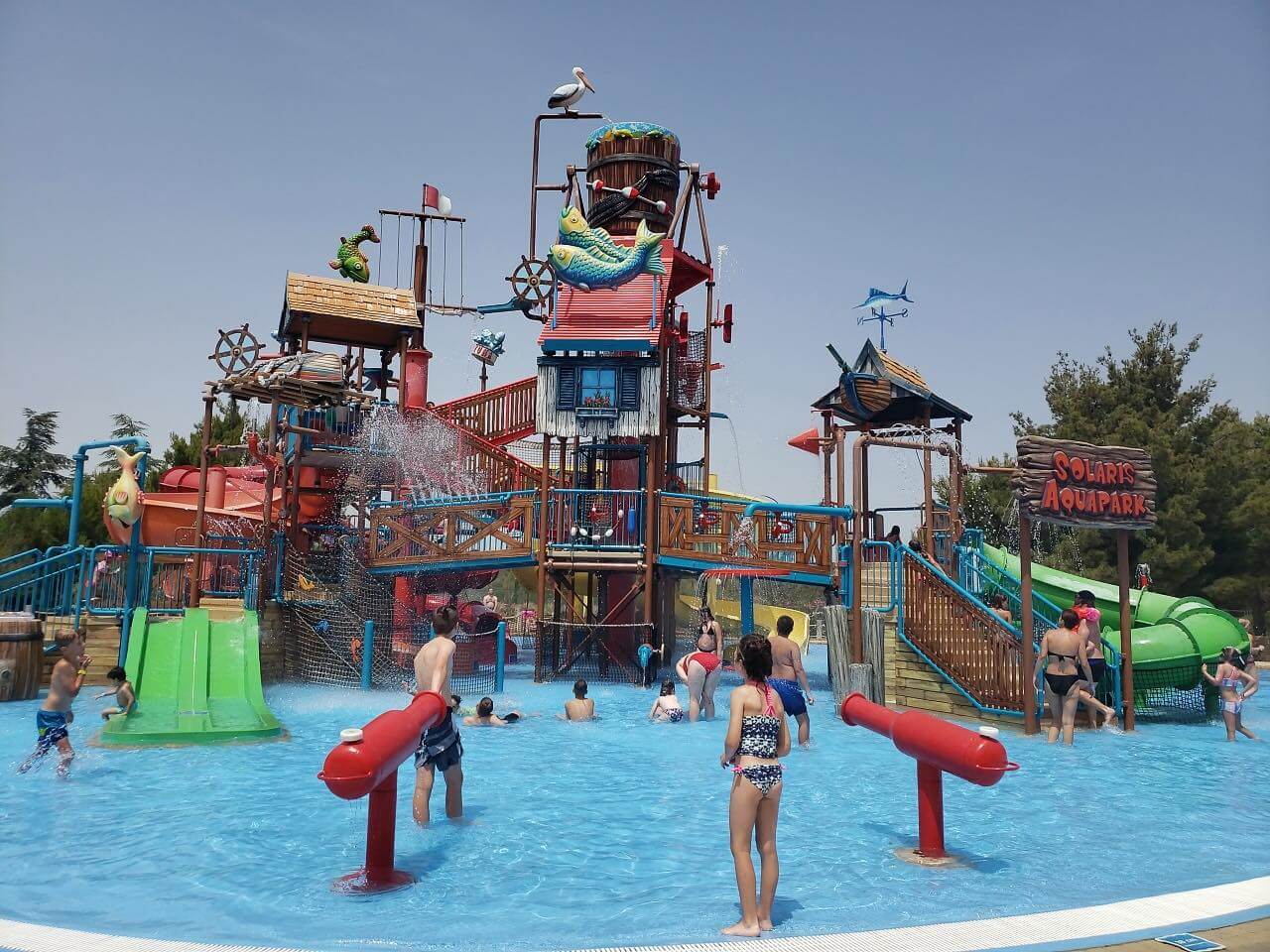
Photo credit: Kyla Ibero
The first themed water park in Croatia, Aquapark Dalmatia, is a hit to families with young children every summer. Located just next to Kids Hotel Andrija and Family Hotel Jakov, the aquapark has 6 huge slides with numerous nozzles, waterfalls, and sprinklers for your kids to bask in. In addition, the long and large "lazy river" where kids and adults can use special floaters provided by the park to cruise the river from beginning to end will be one of their favourites. You can rest easy because the park has professional lifeguards all day to keep watch of your children's safety. A daily ticket includes full water-filled adventure, parasols, beach chairs, and complete wardrobe facilities. Splash Snack bars will take care of your refreshment needs including their famous homemade ice cream.
Other children's entertainments found in Amadria Park include trampolines, animation, mini carting, playroom, and mini club. Families with young kids will also enjoy the Sand Beach found in Amadria Park.
Dolphin Watching Murter
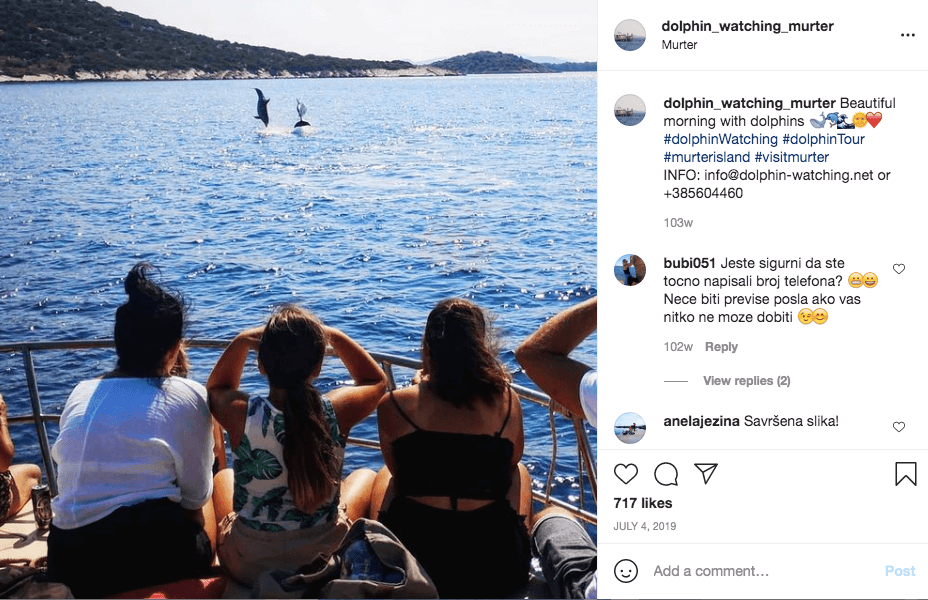 Photo credit: Dolphin Watching-Murter
Photo credit: Dolphin Watching-Murter
Murter is an island in the northwestern part of the Šibenik archipelago and boasts rich wildlife flora including frequent sightings of dolphins. Dolphin-watching is a great opportunity to educate kids about these extremely intelligent and social animals and marine life. Dolphin Watching Tour - Murter excursions will allow your kids to safely interact with these amazing creatures. The excursions last for 2 to 3 hours, depending on the weather conditions and the number of participants.
What to expect?
A welcome drink awaits the guests as they settle in the ship while receiving information about the trip, dolphins, Island Murter, and basic safety on board. For the next 2-3 hours, the ship will explore all the Murter aquatics and the surroundings frequented by dolphins. When the dolphins are spotted, the ship will slowly approach them and some of the dolphins swim near the ship where their voices can be heard by everyone. It is important to remember that dolphins are wild animals whose behavior is unpredictable, so always observe from a distance and with care. Depending on the weather conditions, the guests are allowed to swim for half an hour, or more, after the sighting. If in any case no dolphins were spotted that day, the guests are entitled to one free trip with 20 days validity.
Semi-submarine Split
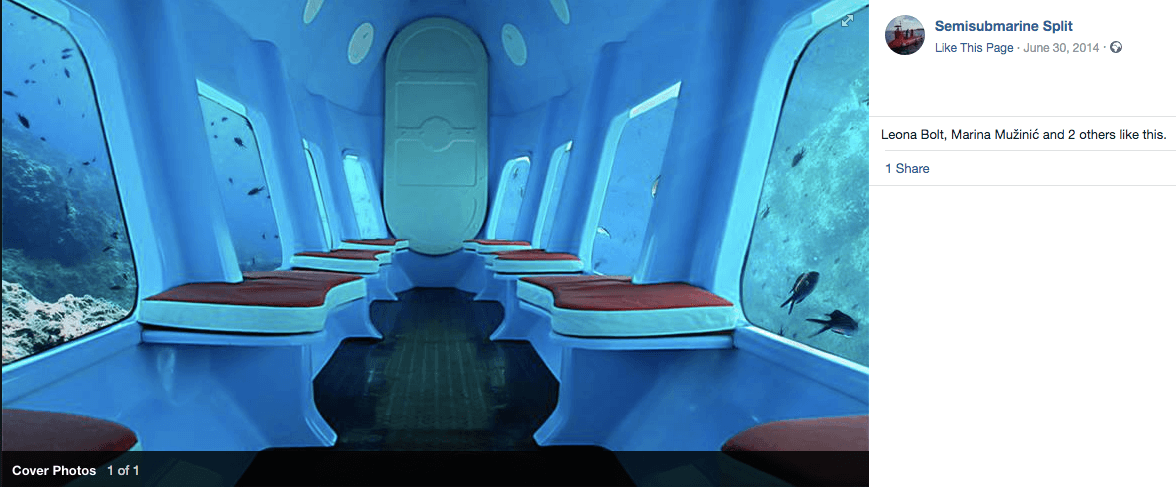
Photo credit: Semi submarine Split
Split is the second-largest city in Croatia and one of the top family holiday destinations in summer. It is famous for Diocletian Palace located in its centre and a beautiful Riva lined with amazing cafes and restaurants, Split also offers a lot of fun family activities and excursions including this interesting underwater marine tour provided by Semi-submarine Marijeta. The underwater excursion departs from Split Riva in the centre of the Split harbour. Semi-submarine Marijeta offers its passengers a personal viewing window where they can watch the active and rich marine life of the Adriatic Sea. The unique vessel remains above sea level at all times while the hull functions as the underwater observatory and stays 1.5 meters below the surface. The passengers can also enjoy the wonderful views of Split City and the warmth of the sun on the ship's deck at any time. This company offers day tours and night tours with underwater lights starting at 7EUR for kids up to 12 years and 14EUR for adults, while families can avail of special discounts!
For more on lifestyle in Croatia, follow TCN's dedicated page.
For more about Croatia, CLICK HERE.
ZSE Indices Increase By 0.51%
ZAGREB, 24 June 2021 - The main Zagreb Stock Exchange (ZSE) indices increased by 0.51% each on Thursday, the Crobex to 1,998.59 points and the Crobex10 to 1,226.58 points.
Regular turnover was HRK 4.16 million or about HRK 850,000 more than on Wednesday.
Another HRK 14.8 million was generated in block trading with the stock of the HT telecommunications company at HRK 185 per share. In the regular session, HT generated a turnover of HRK 282,000, and the price of its shares went up by 0.54% to HRK 185.
In regular trading, the Valamar Riviera stock generated the highest turnover, of HRK 807,800, closing at HRK 31.10, up 1.30%.
A total of 34 stocks traded today, with 17 of them recording share price increases, four registering share price decreases, and 13 remaining unchanged.
(€1 = HRK 7.488952)
For more, follow our business section.
Kraus Asks for Banning Ustasha Salute on Behalf of Thousands of Victims
ZAGREB, 24 June 2021 - The president of the Zagreb Jewish Community, Ognjen Kraus, called on Thursday for banning the "For the homeland ready" salute as well as Ustasha insignia and the denial of Ustasha crimes in the name of the thousands killed under the Ustasha salute.
Speaking at the Jadovno 1941 Remembrance Day commemoration, Kraus said he was making his appeal on behalf of the thousands who were killed at Jadovno and other Ustasha death camps in the 1941-45 Independent State of Croatia (NDH), or who were taken to Nazi death camps.
Kraus also called for banning the denial of the existence of concentration and death camps.
The commemoration was held on the 80th anniversary of the establishment of the Gospić-Jadovno-Pag complex, the first Ustasha death camp on NDH territory.
"It would be horrible to think that the NDH got rid of its Serbs, Jews, Roma, and communists in 1941 easier than the Republic of Croatia are getting rid in 2021 of forgetting their suffering and the legacy of Ustashism which 'For the homeland ready' symbolizes," said Serb National Council (SNV) president Milorad Pupovac.
He asked why someone cared so much that one of the "most shameful salutes and expressions of patriotism in Croatian history" should not lose the right to official and public usage.
"Is such persistence in defending that official salute of the Ustasha movement and the so-called NDH a consequence of knowing about its racial laws and the genocide crimes against Serbs, Jews, and Roma? (...) Or is that persistence a consequence of the ignorance, which has been growing bigger by the year over the past 30 years, of what and whom that salute is a lasting symbol?"
Serbian president's envoy: We have the duty to conduct reconciliation policy
Serbian President Aleksandar Vučić's envoy Veran Matić said that just as he was working on "reconciliation and healing after the war disintegration of the common state and the horrors we experienced in those wars," such a reconciliation policy should also be pursued concerning the horrors of WWII, notably those committed at Jadovno and Pag.
"I consider that our duty to the innocents killed here, to the generations which we should enable to be free of crime, to morally rise above crime and to have the moral strength for peace, for living without hate and for reconciliation between the peoples in Croatia, the peoples in Serbia, and reconciliation between Croatia and Serbia," Matić said.
Wreaths were laid at the monument at Jadovno by Boris Milošević on the government's behalf, Dragana Jeckov on parliament's behalf, Matić, Kraus, and Pupovac on the SNV's behalf, and representatives of the SABA antifascist alliance and the Serbian and Austrian embassies.
The commemoration was organized by the SNV with the Coordination of Jewish Communities in Croatia, the Eparchy of Gornji Karlovac, and SABA.
The Gospić-Jadovno-Pag camp was established on 18-24 June 1941 and the inmates were mostly Serbs, followed by Jews and some Croatian communists. The camp was dismantled around 22 August 1941 at the request of fascist Italy.
That, it was said at the commemoration, temporarily saved over 3,000 inmates who were transported to Jastrebarsko and then the Jasenovac death camp, where many died.
For more about politics in Croatia, follow TCN's dedicated page.


